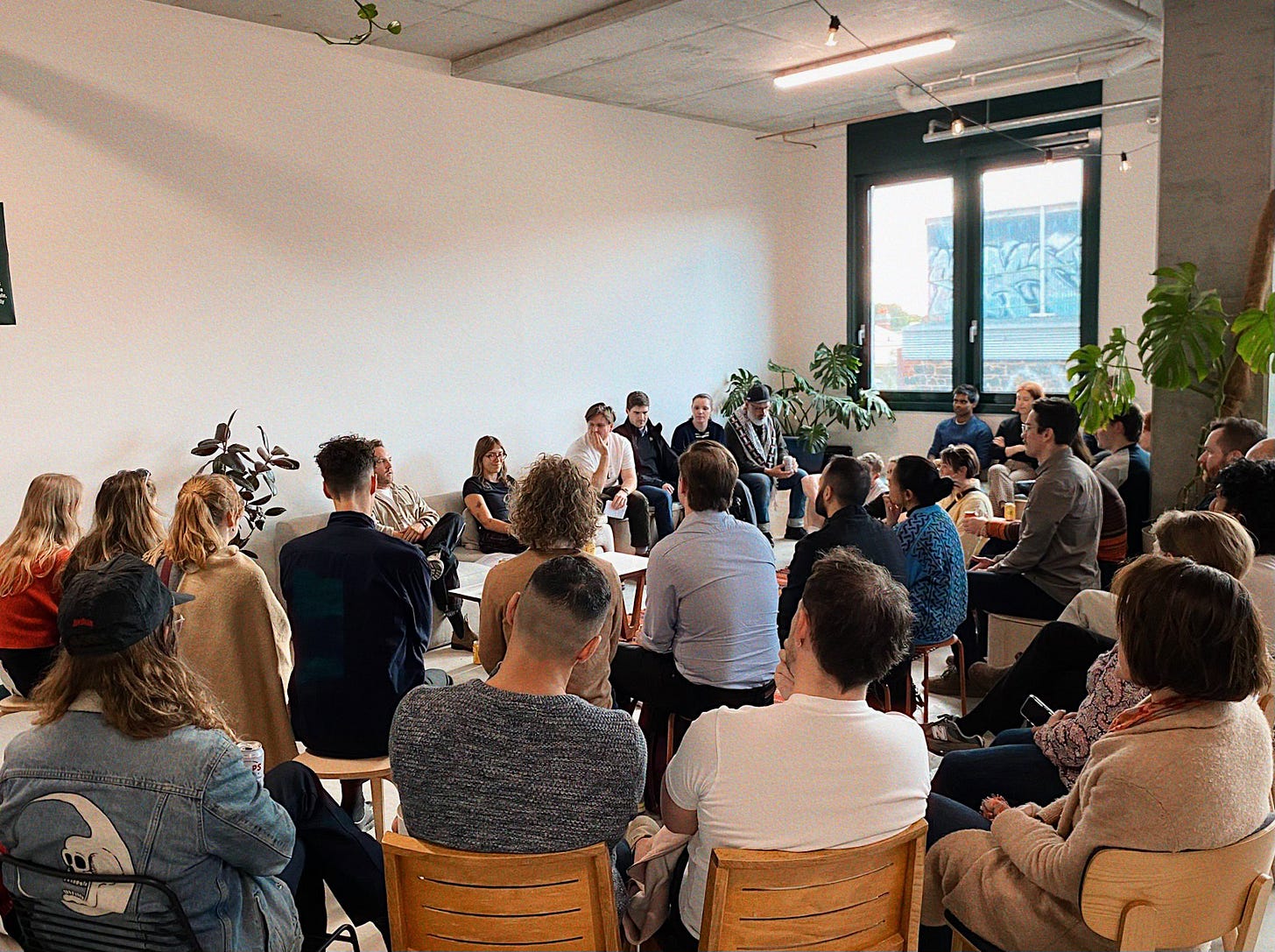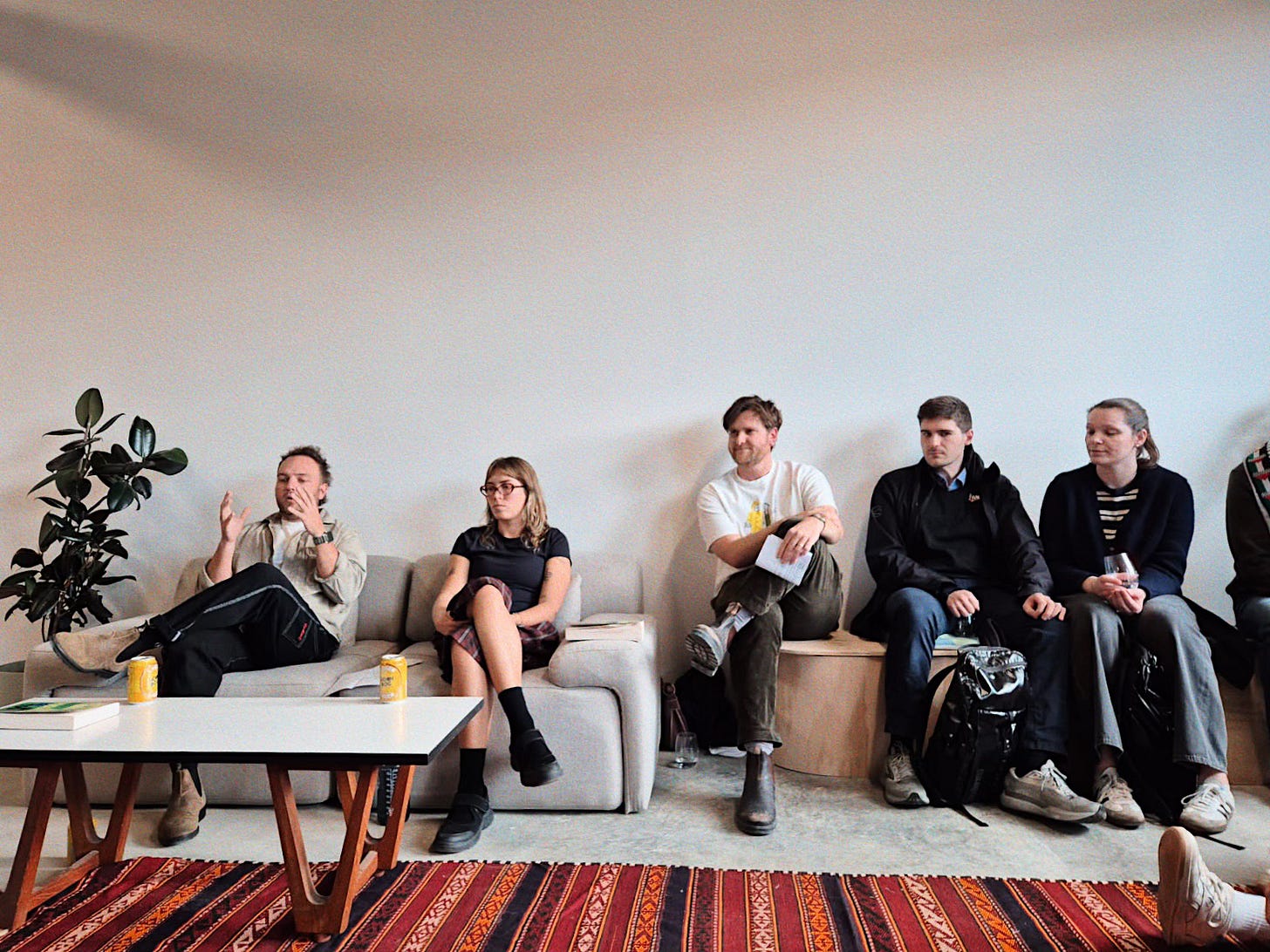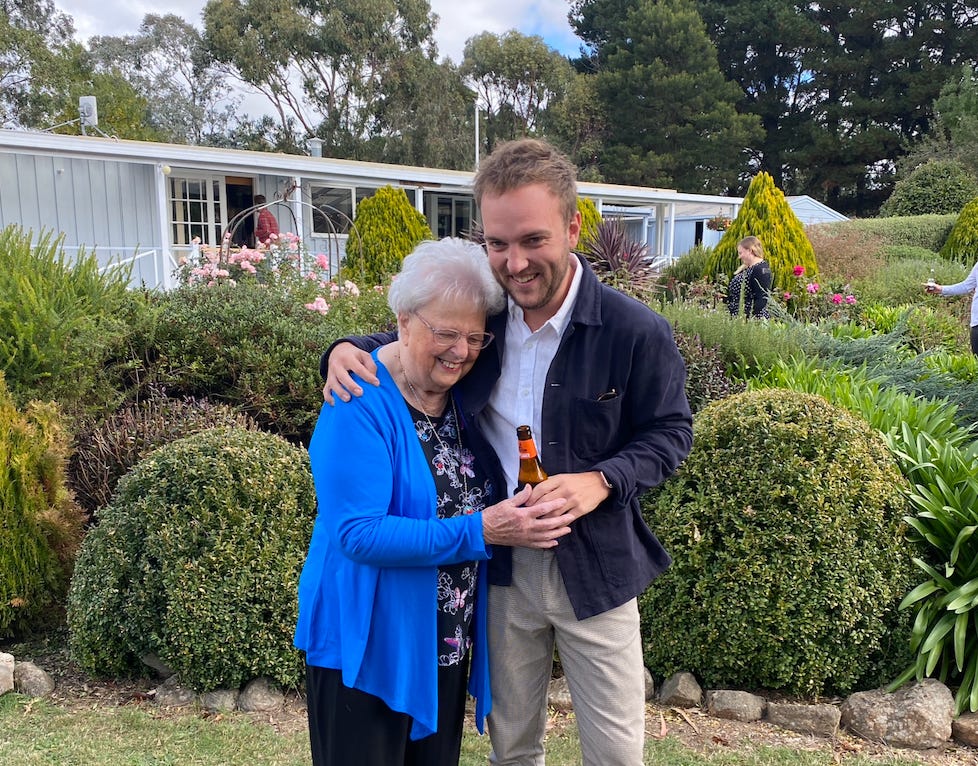Why I want to sit in more circles
Capitalism promised us choice. Community is what actually gives it to us.
Last week, I (somewhat belatedly) launched Better Things Are Possible in Naarm/Melbourne at Think Forward Kiosk in Brunswick with comrades whose advocacy work I deeply respect: Tegan Lerm (co-founder of Project Planet and Build a Ballot) and Thomas Walker (CEO of Think Forward).
Tom pushed the desks aside, gathered whatever chairs he could find, and we all sat in a semi-circle at roughly the same level. I could make eye contact with every person in there. I could see people nodding along. It felt like a proper yarn, rather than a lecture. Tom, Tegan, and I took turns asking each other questions before opening it up to the rest of the room.
Tom opened by asking everyone: “Do you believe better things are possible?”
Every hand in the room went up.
Good start.
I often say the book is glued together by hope—the kind built through collective action. When you sit with people who have wildly different lives but share similar anxieties, and you actually talk honestly about what’s going on, apathy starts to wane. The conversation ranged through all the hits, from climate to housing to inequality, but the theme stayed constant: neoliberalism has stolen our capacity for community. Reclaiming it is the answer.
Solving problems together is muscle memory. We just need to flex it again.
“But What About Agency?”
Anyone who’s read my work knows I won’t shut up about community and collective strength. So later in the evening, when someone asked, “But what about agency?” I was stumped.
Fair question. I really hadn’t been talking about the self in any positive way—I’d been too busy railing against selfishness. My mind went straight to privilege: those with more privilege have more agency and, therefore, more responsibility to use it to lift others up. I focused on that and explained how it underpins my sense of responsibility to speak on these topics.
But as Tom and Tegan spoke, something clicked. The question wasn’t about privilege as a theory of change. It was about something more fundamental: control over our own lives. Not who has more power to act, but whether any of us have the freedom to act at all. If we emphasise community over individualism, what happens to the individual? Don’t we risk losing autonomy?
And I realised: we haven’t had meaningful individual agency for a long time.
“And, you know, there is no such thing as society. There are individual men and women, and there are families. And no government can do anything except through people, and people must look to themselves first. It’s our duty to look after ourselves.” — Margaret Thatcher, 1987
For all the preaching about individualism from neoliberalism’s architects, it never empowered the individual. It isolated us from mateship to me-ship.
Neoliberal capitalism promised consumer value through competition—better products, more choice, prosperity through market forces. Instead, it pitted us against each other in a brutal contest for survival while corporations swallowed the very competition they claimed to celebrate.
Sure, we can choose between Optus and Telstra, Coles and Woolies, CommBank and Westpac, and Qantas and Virgin. But whichever you pick, the difference is cosmetic—both telcos are patchy, both supermarkets sell the same shit for the same price, both banks offer identical interest rates, and both airlines cancel flights while hiking the airfares.
Do we really have choice? Is there really any competition?
Oh, and don’t forget—we used to own Telstra, CommBank, and Qantas.
And while we were distracted by the illusion of choice, the real choices—the ones that truly shape a life—were being stripped away. What agency do we really have when most of our income goes to keeping a roof over our heads and food on the table?
Once we’re locked into a 30-year mortgage, our freedom to take risks disappears. We can’t leave a job that’s killing us because we need the pay slip to service our debt. We can’t take time to build something meaningful but uncertain, or to rest when our bodies are screaming for it.
We get stuck. Stuck in jobs we don’t love, stuck in places we may not want to be, just trying to stay afloat. When our life is structured around survival, we don’t get to make big, bold decisions that could truly enrich our lives or change the world.
Stretched by the cost of living, there’s little time or space left. No time to build anything slowly. Little room to be spontaneous.
Community doesn’t erase agency.
Community creates it.
The more we show up for each other, share resources, care for community, the more community cares back, and the more agency we gain. We can make choices from stability rather than fear.
When we share that responsibility, we get back what the current system takes: slack. Time. Margin. Breathing room. The ability to make mistakes without collapse. The courage to take risks because we won’t fall alone.
That slack is where real agency lives. Where you can say no to exploitation. Walk away. Experiment, create, rest, love, build something that matters, even if it doesn’t pay immediately. Not despite community, but because of it.
Living It
This sat heavily with me because the Friday before the event, my beloved Granny passed away. She filled every room with a special kind of warmth, the kind that could make strangers feel like family. She taught us to make sure the people we love know it, and to show up for them however we can—even if just as a hand to hold. Losing my Granny wasn’t the first time I’d lost someone I loved, but it was the first time I’d seen someone I loved without life in their eyes. And it was the only time I’ll ever have to be the one to tell my mum that her mum had died.
Suddenly, the house was packed to the rafters—family flying in from Victoria and New Zealand, mum’s friends dropping off dinners, friends helping pack up Granny’s home. Collective care, collective strength.
As I flew to Melbourne to talk about community, I was living it back home. Something as simple as cooking a meal for someone grieving goes a long way. But collective care and mutual aid aren’t good for capitalism. Uber doesn’t get a cut when a neighbour hand-delivers a handmade meal, after all.
We still know how to care for each other. We do it instinctively in grief.
The tragedy is that we only seem to do it in tragedy.
The challenge? How do we make caring our everyday, not just our emergency response?
The pressures of work, bills, commutes—the relentless daily grind—wedge us apart. Connection gets rationed out, squeezed into odd moments here and there. But I want the fierce tenderness of a crisis—the pouring in, the dropping everything—to be the fabric of every day.
Maybe part of why I care about that is because I grew up with it. My parents’ house has always been that kind of space. An open-door policy: they’ve always got a spare room for anyone who needs it, and a big back deck for family and friends to yarn, laugh, and console each other over the barbie and a beer.
But younger generations don’t really have that anymore. Most of us can barely afford one room, let alone a spare one. We rent apartments where you can’t fit ten people around a table, with walls we couldn’t dream of painting a colour that matched our own sense of self. This is one of neoliberalism’s cruellest tricks—it hasn’t just eroded our third spaces, it’s eroded space itself. We’re crammed in and isolated at the same time. No room to gather, no room to breathe, no room that’s actually ours.
But the knowledge of how to rebuild isn’t lost. On this continent, Aboriginal and Torres Strait Islander people have been gathering in circles, sharing responsibility, solving problems collectively for more than 65,000 years. We’re relearning what’s been known here for tens of thousands of years. We might not all have space at home, but we have pubs and parks, booth seats and benches. There are still spaces left to look each other in the eye and say, “Let’s figure this out together, yeah?”
Building Bridges
But the work isn’t just about creating spaces—it’s about who gets to be in them. Community and care have to extend beyond those who already agree with us. We need to reach people where shame has made them angry—not to validate their anger at the wrong targets, but to redirect it at the right ones.
When people can’t afford rent, feel isolated, and are told their struggle is personal failure, shame becomes resentment. Resentment gets weaponised. We’ve had 40 years of neoliberalism telling us that if we’re struggling, it’s our fault. When people are struggling, they’re vulnerable to simple stories that blame the wrong people—immigrants, minorities, anyone who looks or sounds different.
Every country picks a different scapegoat, but the pattern stays the same. It’s always the most vulnerable who get blamed for structural problems they are most likely to be victims of and certainly didn’t create. That’s deliberate. It directs anger downward rather than upward—away from the billionaires, the lobbyists, and decision-makers who created these conditions.
The job then is to offer a real alternative. Not rhetoric, but material improvements people can feel: renters’ rights, housing security, wage growth, affordable healthcare, community, and stability—the ability to breathe. And we do that while standing firm: we never throw any group under the bus. We don’t sacrifice anyone to “win back” the working class. That is not justice.
The answer is to pair solidarity with a clear alternative—space for people to bring what they’re carrying: exhaustion, grief, anger, ideas, hope. Space to share problems and solutions, in a system that tells us to survive alone.
In doing so, we dismantle the system that separated us and hand each other back the agency we deserve.
That’s the work I want to keep doing. We all crave this connection. It doesn’t matter whether it’s a back deck, a pub, or an office in Brunswick. It just matters that we talk about the future.
So text three mates. Book a booth. Push some chairs into a circle. Stop waiting for the perfect moment or the right credentials or someone else to go first. Just sit together.
You can grab Better Things Are Possible from your local bookstore or online. If you’ve already got a copy, a quick review on Booktopia, Goodreads, or even Amazon (sigh) would mean a lot; it really helps.
Cheers,
JT





